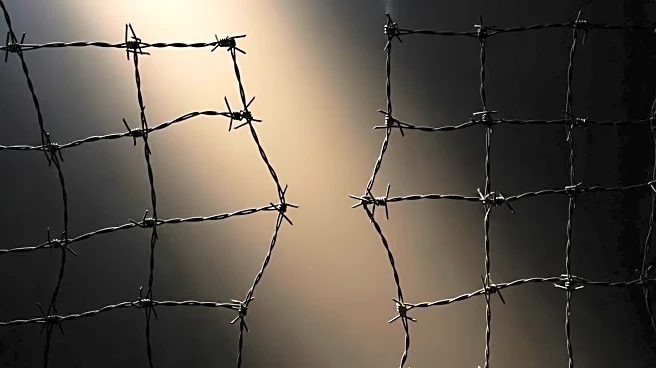What's Happening?
Israel has decided not to release Marwan Barghouti, a prominent Palestinian leader, as part of a prisoner exchange deal with Hamas under the new Gaza ceasefire agreement. Barghouti, who is serving multiple life sentences for his involvement in attacks that killed five people, is viewed by Israel as a terrorist leader. However, he is considered by many Palestinians as a unifying figure and a potential successor to Palestinian Authority President Mahmoud Abbas. The ceasefire agreement involves Hamas releasing about 20 Israeli hostages, while Israel will free approximately 250 Palestinian prisoners, including those held without charge. Despite Hamas's insistence on Barghouti's release, Israel has maintained its stance, fearing his potential influence as a rallying figure for Palestinians.
Why It's Important?
The decision to exclude Marwan Barghouti from the prisoner exchange deal has significant implications for Palestinian politics and the broader Israeli-Palestinian conflict. Barghouti is seen as a credible leader who could unify Palestinian factions and strengthen Palestinian institutions, which poses a challenge to Israel's policy of keeping Palestinians divided. His release could shift the political landscape, potentially leading to stronger demands for Palestinian statehood. Additionally, the exclusion of Barghouti from the deal highlights the complexities of negotiating peace and prisoner exchanges in the region, as both sides have deeply entrenched views on the prisoners involved.
What's Next?
The ongoing discussions between Hamas and mediators regarding the release of high-profile prisoners, including Barghouti, could lead to further negotiations or adjustments in the ceasefire agreement. The release of other prisoners may impact the dynamics between Hamas and Fatah, as well as the internal politics within the Palestinian territories. Israel's refusal to release Barghouti may also influence future peace talks and negotiations, as his potential leadership could alter the demands and strategies of Palestinian representatives.
Beyond the Headlines
The refusal to release Marwan Barghouti underscores the ethical and political dilemmas faced by both Israel and Palestine in addressing the legacy of conflict and the path to peace. Barghouti's imprisonment and potential release are emblematic of the broader struggle for Palestinian self-determination and the challenges of reconciling security concerns with aspirations for statehood. The situation also highlights the role of international mediators in facilitating dialogue and the importance of addressing historical grievances to achieve lasting peace.








